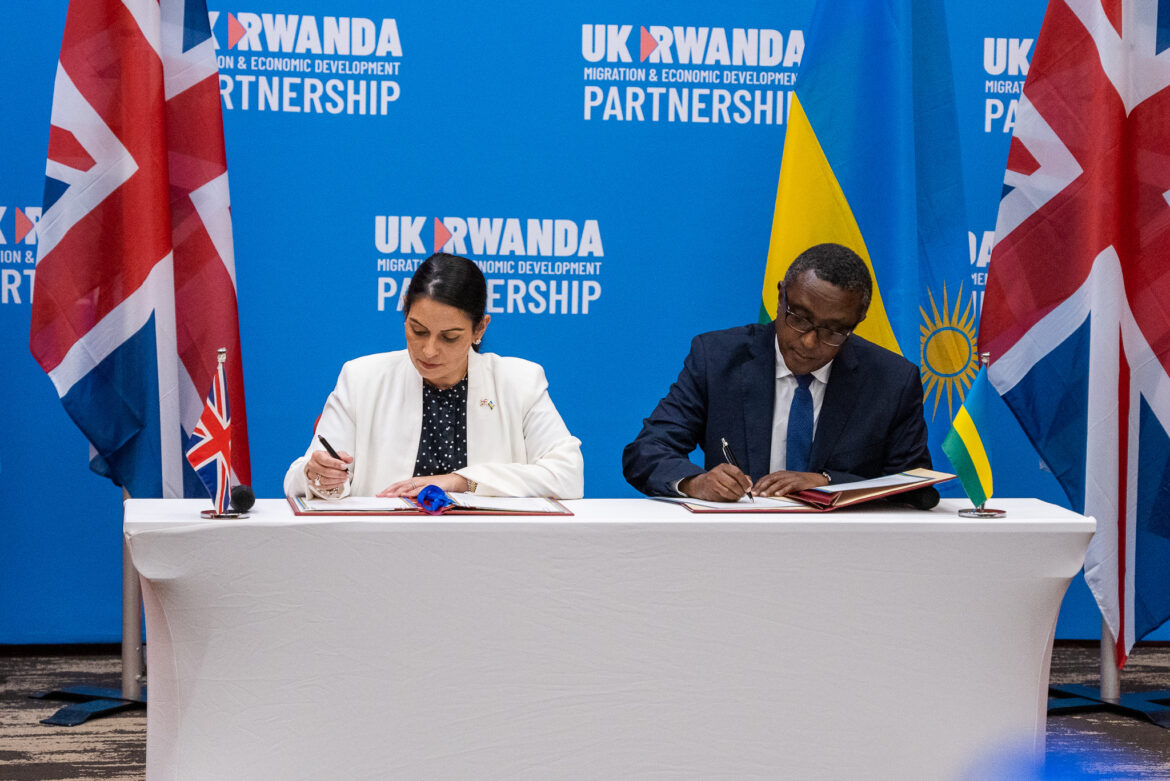On April 14, 2022, the then-British home secretary Priti Patel and the Rwandan foreign minister Vincent Biruta signed a deal to send asylum seekers from the UK to Rwanda. Officially known as the UK and Rwanda Migration and Economic Development Partnership, the Rwandan asylum plan would relocate illegal immigrants and asylum seekers who arrived in the UK starting January 1, 2022, for processing, asylum, and resettlement in Rwanda. Viewed as a response to the rise in Channel crossings in recent years, the Rwanda deal has come under immense scrutiny and criticism for its blatant breach of international human rights laws. As of October 3, 2022, more than 40,000 migrants have crossed the Channel— much more than the 28,000 migrants who travelled across the Channel in 2021.
The UK government aims to deter illegal entry into the country by sending asylum seekers that crossed the Channel to Rwanda, all of whom have made asylum claims in the UK despite being eligible to file their case in safe, third states they were previously present in. If their journey is considered dangerous, they face the possibility of getting their asylum application to the UK rejected. According to the government’s guidance, a dangerous journey is “able or likely to cause harm or injury,” including “those that travel via small boat, or clandestinely in lorries.” During the 5-year trial period, the UK government proposed sending a few hundred asylum seekers to Rwanda each year, with the capacity to send more. Britain has already paid Rwanda £140 million for development and investment in Rwanda, but no flight has left the UK. After facing legal challenges, the first flight, set to depart on June 14, 2022, was cancelled. A series of judicial review challenges in the High Court is stalling the controversial policy as judges consider the plan’s lawfulness. Charities, NGOs, and human rights lawyers have repeatedly criticized the policy and raised concerns about Rwanda’s unsuitability as a destination country for asylum seekers. The reinstated home secretary, Suella Braverman, and Prime Minster Rishi Sunak are firm believers of the scheme. However, they are unlikely to see the plan come to fruition this year as the High Court ruling is likely to be appealed by the losing side.
Activists, NGOs, and human rights lawyers have condemned the deal as illegal and directly opposing international human rights law, namely the 1951 Refugee Convention, which the UK proudly helped to create. The forced relocation of asylum seekers to an unsafe country has resulted in a flagrant violation of the UK’s non-refoulement obligation. Rwanda’s human rights record is questionable as it operates under a one-party authoritarian regime known to imprison, torture, and murder political opponents. In particular, resettled refugees are susceptible to persecution should they protest against government directives. Activists also argue that Rwanda, plagued with internal socioeconomic problems, is ill-suited to welcome asylum seekers. For example, more than half of Rwanda’s population of 13 million are impoverished, living on less than $2 a day. The inflow of asylum seekers from the UK would affect regional refugee flow as unsatisfied asylum seekers are likely to reembark on their journey to Europe.
The UK government seeks to achieve deterrence and cost reduction in refugee resettlement through the Rwanda deal, but the plan appears counterproductive. Deterring asylum seekers from crossing the Channel is likely to be ineffective if only 1-2%, approximately several hundred, of asylum seekers are relocated to Rwanda among the tens of thousands of people that make the journey every year. Successful dissuasion requires ‘resettlement to Rwanda’ to be recognized by asylum seekers as an imminent reality upon arrival, not a consequence they would unlikely face. Furthermore, the UK government’s logic in cutting costs within refugee resettlement is flawed, as paying £140 million to resettle only a fraction of recent arrivals would do little to alleviate its financial burden. Instead, the ‘Rwanda threat’ could drive asylum applicants to leave their asylum accommodation and go underground, further perpetuating the cycle of poverty and vulnerability. Deterrence, how the UK government lays it out, is expected to only divert asylum seekers away from popular routes to potentially more hazardous routes, making asylum seekers more vulnerable to abuse.
The Rwanda deal, amongst other arrangements that outsource asylum seekers, sets a dangerous legal precedent with the potential to threaten the principles enshrined in the 1951 Refugee Convention. Although currently stalled, if the plan proceeds despite its legal challenges, it would undermine and threaten the legitimacy of international refugee principles. This externalization of migration is becoming a visible trend. Australia has offshored asylum seekers to Nauru, and Denmark has created a deal with Rwanda that resembles the UK-Rwanda deal. The US and the EU are no exceptions either, as their hardening borders work to deter asylum seekers. The resumption of the plan and its implementation can have pervasive impacts on global refugee norms and could cause alarming ripple effects. The Rwanda deal commodifies refugees as transactional tools for diplomacy and negotiations rather than offering protection based on moral grounds— it is, at best, a Band-Aid solution.
Edited by Malia Yee

Ryan Kim is in his third and final year at McGill University, currently pursuing a B.A. in Political Science and International Development. He is a staff writer at Catalyst. He is particularly interested in human rights, refugees, and migration.

